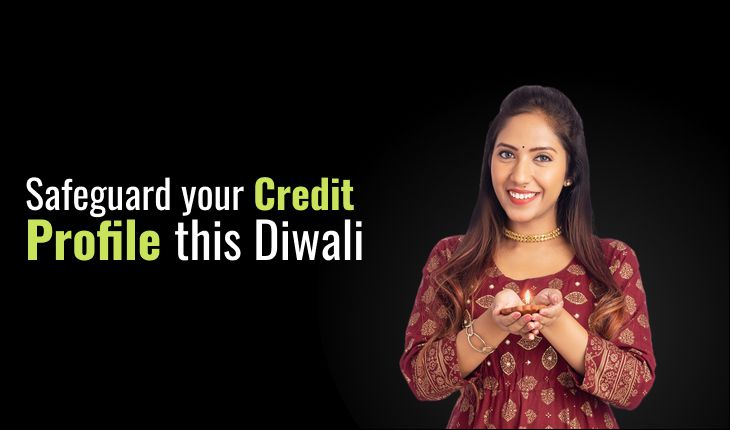Safeguard your Credit Profile this Diwali

Last Updated : Nov. 4, 2022, 12:03 p.m.
Most Indians make practically all of their major purchases, as well as minor ones, around the auspicious event of Diwali. Everything is purchased from houses to vehicles to electronic devices during this time. This Diwali, when you surf various eCommerce sites, check out the appealing offers, and make purchases, remember to be cautious when inputting your information. Here are a few precautionary measures to Protect your financial information, credit card information, and Credit score from internet scammers, safeguard your online identity and prevent being a victim of credit fraud during Diwali.
Personal financial information or OTPs should not be shared
Persons involved in credit fraud may pose as bank staff and request an OTP (one-time password) for verification. Remember that banks and their authorised workers never request OTPs over the phone. If you receive a phone call requesting these details, quickly hang up and notify your bank.
Avoid clicking on any questionable links
Avoid clicking on links on commercial emails, texts, and social media pages. Phishing emails sent by fraudulent people might also fool you by referring you to a bogus website. Before completing a transaction, double-check the URL of the banking website or payment platform. An easy way is to look for the lock symbol and the initials ‘HTTPS:’ before entering any information or making a payment.
Be cautious with public networks
When you connect to an insecure public network, avoid doing financial transactions on public networks, and check for ‘forget network’ after using public wi-fi. When connected to the public internet, use a VPN to surf since it encrypts your data between the browser and the server. If you don’t have access to a VPN, make sure you only browse encrypted websites.
Filter the personal information you post online
Personal information such as your date of birth, Aadhar number, and bank account information are vulnerable to exploitation, so avoid giving such information to unauthorized sites. Also, when discarding physical copies of your PAN and Aadhar cards , bank statements, CIBIL scores, or invoices, destroy them to prevent any information printed on them from being put together.
Examine your bank, credit card, and wallet statements carefully
Sign up for transaction updates on your mobile phone to stay connected to your accounts. If you discover any suspicious behaviour, contact your banking institution immediately, and if you have reasonable doubt that it is a discrepancy, report and block your card. Fraudsters frequently do small transactions before attempting larger ones to order to get out of the victim’s attention.
Monitor your CIBIL score regularly and report any fraudulent activity
Checking your CIBIL score is one of the finest methods to simultaneously keep track of all your credit cards and loan accounts. The accounts information portion of your CIBIL score summarises any credit you have obtained. Examine this area and inform CIBIL if you discover any accounts that are not yours. This will assist you in tracking any strange activity that may signal credit fraud or identity theft. You may also sign up for CIBIL and receive CIBIL Alerts to be alerted of significant changes in your CIBIL score or any strange behaviour that may signal credit fraud.
Symptoms of online fraud
Regardless of whether you have taken all essential safeguards, if you observe any of the following symptoms, you may have been a victim of identity theft and fraud.
- You receive billing invoices or credit cards for which you did not apply.
- You receive notifications from your bank or financial institution informing you of an unexpected login, a request for transaction verification, or a change in contact information.
- You receive phone calls from debt collectors for services or goods you did not acquire.
- You discover an account on your credit history that you do not recognise.
- Unauthorised and unusual charges have appeared on your account.
What to do when there are any discrepancies
If you discover any fraudulent activity, you can follow these steps –
- First, contact your financial institution or bank for assistance if you have received any statements, invoices, or fraudulent notifications and block your card.
- Request an instant password change for your online banking, emails, and social media.
- Then completely review your CIBIL score for new account openings, or you can contact financial professionals to do it for you. They may be able to lower your chances of suffering a larger financial loss or other harm.
These are the precautions and steps you can take to protect your financial information, credit card information, and CIBIL score from internet criminals, protect your online identity and avoid being a victim of credit fraud during Diwali.
